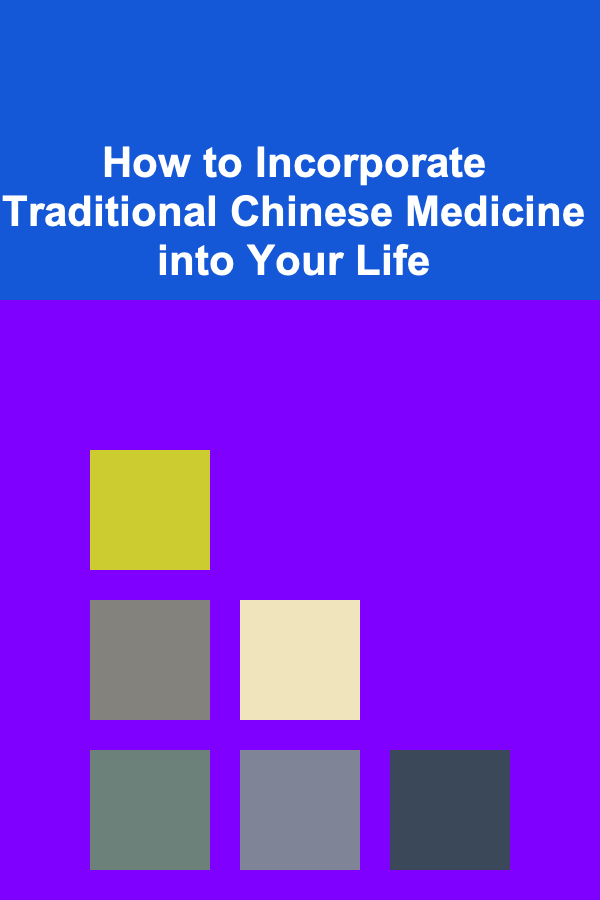
How to Incorporate Traditional Chinese Medicine into Your Life
ebook include PDF & Audio bundle (Micro Guide)
$12.99$11.99
Limited Time Offer! Order within the next:

Traditional Chinese Medicine (TCM) is one of the oldest and most comprehensive medical systems in the world. With a history spanning thousands of years, TCM offers a holistic approach to health and wellness that emphasizes the balance of body, mind, and spirit. In a fast-paced world increasingly dominated by modern medical technologies, many people are seeking ways to incorporate more natural, preventive, and healing practices into their lives. TCM is a powerful and time-tested method for enhancing well-being, offering a broad range of therapeutic practices such as herbal medicine, acupuncture, tai chi, qigong, and dietary adjustments.
This article explores how to integrate Traditional Chinese Medicine into your daily routine, providing practical tips and an understanding of the core principles of TCM to guide you on your path to greater health.
Understanding the Core Principles of Traditional Chinese Medicine
To incorporate TCM into your life effectively, it's essential to first understand its foundational concepts. TCM is built on a worldview that seeks harmony and balance within the body, mind, and environment. The system focuses on the interconnections between various aspects of life, considering the body as a whole rather than isolated symptoms. Below are some of the key principles:
1. Yin and Yang
The concept of Yin and Yang is central to TCM and describes the dualistic nature of all things. Yin and Yang are opposites that are interdependent, constantly interacting, and seeking balance. In TCM, health is believed to result from the harmonious balance of Yin (the feminine, passive, cold, and restorative energy) and Yang (the masculine, active, warm, and energizing energy). Illness arises when there is an imbalance between these forces. For example, too much Yang can cause symptoms like heat, restlessness, or inflammation, while too much Yin can lead to coldness, fatigue, or weakness.
By understanding the balance of Yin and Yang in your body, you can make more informed decisions about lifestyle changes, diet, and treatments to maintain health.
2. Qi (Vital Energy)
In TCM, Qi is the vital life force that flows through the body, much like blood flows through veins. Qi is responsible for energy, vitality, and overall health. When Qi is abundant and flows freely, the body is in a state of health. However, when the flow of Qi is blocked or its levels are deficient, disease and discomfort can arise. The goal of TCM treatments, such as acupuncture or herbal remedies, is often to restore the smooth flow of Qi throughout the body.
Understanding the role of Qi can help you focus on practices that promote energy flow, such as tai chi, qigong, and acupressure, which can be powerful tools for enhancing your health.
3. The Five Elements
The Five Elements (Wood, Fire, Earth, Metal, and Water) are another important aspect of TCM. These elements represent different aspects of life and the body and are thought to influence each other in various ways. Each element corresponds to specific organs, emotions, and bodily functions. For instance:
- Wood is associated with the liver and gallbladder, and governs creativity and growth.
- Fire corresponds to the heart and small intestine, governing emotions like joy.
- Earth is linked with the spleen and stomach, and represents nourishment and digestion.
- Metal corresponds to the lungs and large intestine, linked with grief and the ability to release.
- Water is associated with the kidneys and bladder, governing fear and the body's ability to store energy.
Understanding the Five Elements can help you make dietary choices and select practices that support specific organs and functions of your body.
4. Holistic Approach to Health
TCM views the body as an interconnected system where physical health, mental well-being, and emotional states are deeply connected. TCM seeks to address the root cause of illness, rather than just alleviating symptoms. This holistic approach encourages individuals to consider their overall lifestyle, including their diet, emotions, physical activity, and relationships, as contributing factors to their health.
Practical Ways to Incorporate Traditional Chinese Medicine into Your Life
Now that we have an understanding of the key principles of TCM, let's explore practical ways you can incorporate TCM into your daily life. Whether you are seeking a natural remedy for a common ailment or looking to enhance your overall well-being, TCM offers numerous tools that can be adapted to your routine.
1. Incorporating TCM Dietary Practices
One of the simplest and most accessible ways to integrate TCM into your life is through food. In TCM, food is considered medicine, and different foods have specific properties that can influence your health. The basic philosophy is to consume foods that balance the body's internal energies, whether Yin, Yang, or Qi.
- Eat Seasonally: According to TCM, different seasons require different foods to maintain balance. For example, in the winter, you may want to consume more warming foods such as stews and soups, which nourish the Yang energy. In contrast, in the summer, light, cooling foods such as salads and fruits help support the body's Yin.
- Balance Your Diet: A balanced diet in TCM includes a variety of flavors: sweet, salty, bitter, sour, and spicy. These flavors correspond to different organs and help nourish them. For instance, sour foods (like vinegar or lemon) are believed to support the liver, while bitter foods (like bitter melon) help to cool and detoxify the body.
- Herbal Teas: Many herbs are used in TCM for their healing properties. Incorporating herbal teas into your daily routine is a great way to benefit from the medicinal properties of plants. Common herbs used in TCM include ginger (to warm the body and improve digestion), chrysanthemum (for cooling and promoting relaxation), and ginseng (for energy and immune support).
2. Practicing Acupuncture and Acupressure
Acupuncture, a cornerstone of TCM, involves the insertion of thin needles into specific points on the body to stimulate the flow of Qi and restore balance. While acupuncture requires a trained practitioner, acupressure (the practice of applying pressure to acupuncture points) can be done at home and is an excellent way to maintain the flow of Qi.
- Self-Acupressure: Learning a few acupressure techniques can help alleviate common ailments like headaches, fatigue, and digestive issues. For example, pressing the point located between your thumb and index finger, known as the "Hegu" point, can help relieve headaches and neck pain.
- Seeking Professional Acupuncture: If you are dealing with chronic pain, stress, or specific health concerns, you might consider visiting a licensed acupuncturist. Regular sessions can help restore balance and enhance your overall well-being.
3. Incorporating Tai Chi and Qigong
Tai Chi and Qigong are ancient Chinese exercises that combine slow, deliberate movements with controlled breathing to cultivate and balance the flow of Qi. These practices promote flexibility, balance, and mental clarity, making them excellent for reducing stress and improving overall health.
- Tai Chi: This practice is often described as "meditation in motion." It involves performing slow, flowing movements that improve balance, coordination, and flexibility. Tai Chi is particularly beneficial for older adults, as it improves muscle strength, reduces stress, and enhances overall vitality.
- Qigong: Qigong is a gentle practice that involves slow movements, deep breathing, and visualization techniques. Qigong exercises are designed to enhance the flow of Qi and cultivate internal energy. Practicing Qigong regularly can improve circulation, boost the immune system, and promote emotional balance.
4. Herbal Remedies and Supplements
Herbal medicine is a significant component of TCM, with countless herbs used for various purposes such as boosting immunity, improving digestion, and managing stress. Many TCM practitioners recommend using specific herbs based on an individual's constitution, symptoms, and diagnosis.
- Ginseng: Known as an adaptogen, ginseng is often used to boost energy levels and improve mental clarity. It is also used to support the immune system and reduce stress.
- Goji Berries: These nutrient-dense berries are commonly used in TCM to improve longevity, support liver function, and enhance vision. They are often consumed in soups, teas, or as a snack.
- Astragalus: This herb is used to strengthen the immune system, boost energy, and support the lungs. It is often found in immune-boosting formulations.
When using herbal remedies, it's important to consult with a TCM practitioner to ensure the herbs are appropriate for your specific needs.
5. Mindfulness and Emotional Balance
In TCM, emotional well-being is closely linked to physical health. Emotions such as stress, anger, and fear are thought to affect the flow of Qi and can contribute to imbalances within the body. TCM recommends various practices to cultivate emotional harmony and balance:
- Meditation: Incorporating daily meditation practices can help calm the mind and restore balance to your emotions. Meditation techniques such as mindfulness, focused breathing, or visualizations can help clear negative emotions and improve mental clarity.
- Breathing Exercises: Deep, diaphragmatic breathing exercises can stimulate the flow of Qi and improve relaxation. Qigong practices often include breathwork, which can be a helpful tool for managing stress and cultivating emotional well-being.
Conclusion
Incorporating Traditional Chinese Medicine into your life offers a holistic approach to health that considers the body, mind, and spirit. Whether you're looking to manage stress, improve your energy levels, enhance physical vitality, or prevent illness, TCM provides a rich array of tools to help you live a balanced and harmonious life.
By embracing the principles of Yin and Yang, cultivating the flow of Qi, and integrating practices such as acupuncture, herbal remedies, dietary adjustments, and mindful exercises like Tai Chi and Qigong, you can foster a deeper sense of well-being. The wisdom of TCM encourages us to nurture our health naturally, promote balance in all aspects of our lives, and approach wellness with a holistic perspective that has endured for centuries.
Incorporating TCM into your daily life is a personal journey that requires patience and mindfulness. But with the right guidance and consistent practice, you can experience the profound benefits of Traditional Chinese Medicine in every aspect of your health and well-being.
Reading More From Our Other Websites
- [Home Party Planning 101] How to Create a Stylish and Functional Party Setup
- [Personal Financial Planning 101] How to File Your Own Taxes: A Step-by-Step Guide for First-Timers
- [Personal Care Tips 101] How to Create a Relaxing Bedtime Routine for Better Sleep
- [Personal Financial Planning 101] How to Choose the Best Financial Planning Software for Your Family's Goals
- [Home Party Planning 101] How to Plan a Baby Shower at Home: A Cozy and Joyful Celebration
- [Home Rental Property 101] How to Rent Houses with a Mudroom for Convenient Living and Organization
- [Home Storage Solution 101] How to Maximize Closet Organization with Adjustable Shelving
- [Home Family Activity 101] How to Make Family Cooking Time Fun with Creative Recipes
- [Personal Investment 101] Building an Online Business Using Deep Learning for Passive Income
- [Sewing Tip 101] Creative DIY Projects: Adding Decorative Zippers to Your Wardrobe

How to Keep Accurate Financial Records for Your Rental Property
Read More
How to Keep Your Home Safe During the Holidays
Read More
How to Plan a Family Game Night That Everyone Will Enjoy
Read More
How to Sell Digital Products Successfully for Game Developers
Read More
How to Sell Your Old Comics Online: A Step-by-Step Guide
Read More
How to Use Hanging Baskets for Craft Supply Storage
Read MoreOther Products

How to Keep Accurate Financial Records for Your Rental Property
Read More
How to Keep Your Home Safe During the Holidays
Read More
How to Plan a Family Game Night That Everyone Will Enjoy
Read More
How to Sell Digital Products Successfully for Game Developers
Read More
How to Sell Your Old Comics Online: A Step-by-Step Guide
Read More